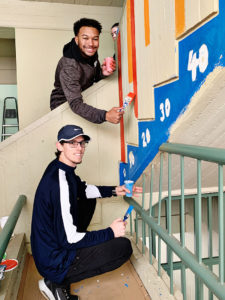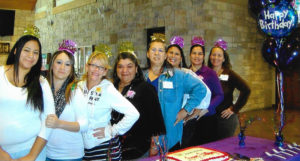Northwest Baptist Convention exec nominee for SBC president
VANCOUVER, Wash. (BP)—A group of Southern Baptists announced Jan. 14 their intention to nominate Randy Adams, executive director of the Northwest Baptist Convention, as president of the Southern Baptist Convention.
Blake Gideon, pastor of First Baptist Church in Edmond, Okla., and president of the Baptist General Convention of Oklahoma, is the intended nominator of Adams at the SBC annual meeting, June 9-10 in Orlando, Fla.
The only other nominee for the SBC presidency so far is Al Mohler, president of Southern Baptist Theological Seminary in Louisville, Ky., who will be nominated by H.B. Charles, pastor of Shiloh Metropolitan Baptist Church in Jacksonville, Fla.
If elected, Adams said, he would aim to focus on the SBC’s Great Commission efforts and rebuilding trust among the convention’s churches, entities and other organizations, the Northwest Baptist Witness reported.
‘Need a clear change in direction’
In an announcement on Adams’ personal website, he stated his belief the SBC needs a directional shift.
“I am allowing my name to be entered into nomination for the presidency of the SBC because I believe that we need a clear change in direction in order to fulfill our God-given mission and reverse our present course of decline in every key measurement of Great Commission advance,” Adams said.
“While Southern Baptists retain considerable ability to impact the world for Christ, we are currently experiencing our greatest challenge. After waging a decades-long battle for the Bible, we are in danger of losing the war we were founded to fight, that of advancing the Great Commission by making disciples and rescuing the captives of the evil one.
“If we do not honestly confront issues others will do so, including those who do not love the SBC like we do. Christians must be able to engage in honest discourse, speaking the truth in love.”
Adams said although he believes the SBC is in the midst of great challenge, it also is a time of immense opportunity—a chance to recommit to the purpose of advancing the Great Commission.
‘Experience, integrity and vision’
Gideon cited Adams’ goals for the SBC as reason for his nomination.
“His experience, integrity and the vision he has for the SBC is vital,” Gideon said. “We face some increasing challenges from our culture and increasing decline and division in the SBC. Randy is the kind of guy who will lead us according to God’s word, and unite us behind the Great Commission.”
The group of Southern Baptists nominating Adams includes Dale Jenkins, pastor of Airway Heights (Wash.) Baptist Church; Ronny Cooksey, pastor of Sandia Baptist Church in Albuquerque, N.M.; Deris Coto, pastor of Hispanic ministries at First Baptist Church in Fairburn, Ga.; and Troy Smith, pastor of Mill Park Baptist Church, Portland, Ore.,
The group also includes Mary Habila, Northwest Baptist Convention Woman’s Missionary Union president and member of Living Spring Fellowship in Des Moines, Wash.; Denise Hayden, member of Pellville Baptist Church in Hawesville, Ky.; Nick Phoenix, pastor and executive director of Words to Works Ministries in Jacksonville, Fla.; Mike Scifres, member of North Fork Baptist Church in Eufaula, Okla. and Bill Agee, executive director-treasurer of the California Southern Baptist Convention.
A collective group is making this nomination announcement, Gideon said, “in order to demonstrate unity of Southern Baptists from across different demographics and ethnicities. W wanted to express a united effort of people who we believe really reflect the SBC.”
By the numbers
Adams is a member of Go Church, a church plant in Ridgefield, Wash. According to the 2019 SBC Annual Church Profile, the church plant reported 34 members and an average of 100 in weekly attendance. Of total undesignated receipts of $233,660, the church gave $13,805, or 5.9 percent, through the Cooperative Program.
In 2019, the Northwest Baptist Convention, where Adams has served as executive director since 2013, reported Cooperative Program receipts of $2,861,490. Of that, $641,093.65 (22.4 percent), was forwarded to national and international CP causes.
The 2020 budget for the NWBC anticipates $2,920,000 in Cooperative Program gifts from member churches, with $2,236,000 supporting mission work in the Northwest, $584,000 (20 percent) being passed on to the national Cooperative Program allocation budget, and $100,000 to support the work of Gateway Seminary’s Pacific Northwest Campus in Vancouver, Wash.
“His proven leadership over the Northwest Baptist Convention proves his focus in advancing the Great Commission,” Gideon said. “It also demonstrates the value of cooperative work and supporting the Cooperative Program. Through my personal involvement with him, I know him to be a man who has historically strongly supported the Cooperative Program.”

 Blayne Alaniz has joined the University of Mary Hardin-Baylor staff in a newly created position as director of disability services and testing coordinator. Alaniz holds both a Bachelor of Science degree and a Master of Science degree from Texas Tech University. He joined Baylor University’s disability services office in 2013 as an accommodation specialist. In 2015, he returned to Texas Tech, where he became associate director of the student disability services office.
Blayne Alaniz has joined the University of Mary Hardin-Baylor staff in a newly created position as director of disability services and testing coordinator. Alaniz holds both a Bachelor of Science degree and a Master of Science degree from Texas Tech University. He joined Baylor University’s disability services office in 2013 as an accommodation specialist. In 2015, he returned to Texas Tech, where he became associate director of the student disability services office.







 Tomi Jean Anderson Lenamon, a member of Travis Avenue Baptist Church in Fort Worth for 58 years, died Jan 7. She was 85. She was born April 2, 1934, on a farm in Limestone County to Cy and Lizzy Anderson. She graduated from Groesbeck High School, where she was voted class favorite. Upon graduation, she worked as the secretary to the president of the Farmers State Bank. On Aug. 21, 1951, she married her high school sweetheart, Joe T. Lenamon, a 1951 graduate of Texas A&M University. After he completed his service in the U.S. Air Force, the couple moved to Fort Worth. In addition to caring for four children and maintaining a household, she sewed for the public, bought and resold furniture, and worked as a Tupperware dealer. Later, she worked in the offices of several companies, including Christian Education for the Blind and Stewart Title Company. In 1979, she went to work for Search Ministries and retired from there in 1991. At Travis Avenue Baptist Church, she was involved in Woman’s Missionary Union and a variety of mission projects and trips. She and her husband helped initiate a ministry for young married seminary students. Anytime she was told, “You can’t do that,” she replied, “Just watch me.” She once called the White House to complain about an advertising campaign that put cigarettes in mailboxes. She enjoyed tracing her family genealogy, took many family pictures and left her family a treasured heritage in memory books. For many years, she dealt with fibromyalgia and chronic fatigue before it was an accepted diagnosis. Her illness kept her mostly homebound in her later years. She was preceded in death by three brothers, two sisters, and a son, Joel Lenamon. She is survived by her husband of 68 years, Joe T. Lenamon, one of the founders of Texas Baptist Men; daughter Roseanne McAdams and son-in-law John; son Mickey Lenamon, executive director of TBM, and his wife Sallie; son Tony Lenamon; seven grandchildren; and two great-grandchildren, plus two who are expected to arrive in March.
Tomi Jean Anderson Lenamon, a member of Travis Avenue Baptist Church in Fort Worth for 58 years, died Jan 7. She was 85. She was born April 2, 1934, on a farm in Limestone County to Cy and Lizzy Anderson. She graduated from Groesbeck High School, where she was voted class favorite. Upon graduation, she worked as the secretary to the president of the Farmers State Bank. On Aug. 21, 1951, she married her high school sweetheart, Joe T. Lenamon, a 1951 graduate of Texas A&M University. After he completed his service in the U.S. Air Force, the couple moved to Fort Worth. In addition to caring for four children and maintaining a household, she sewed for the public, bought and resold furniture, and worked as a Tupperware dealer. Later, she worked in the offices of several companies, including Christian Education for the Blind and Stewart Title Company. In 1979, she went to work for Search Ministries and retired from there in 1991. At Travis Avenue Baptist Church, she was involved in Woman’s Missionary Union and a variety of mission projects and trips. She and her husband helped initiate a ministry for young married seminary students. Anytime she was told, “You can’t do that,” she replied, “Just watch me.” She once called the White House to complain about an advertising campaign that put cigarettes in mailboxes. She enjoyed tracing her family genealogy, took many family pictures and left her family a treasured heritage in memory books. For many years, she dealt with fibromyalgia and chronic fatigue before it was an accepted diagnosis. Her illness kept her mostly homebound in her later years. She was preceded in death by three brothers, two sisters, and a son, Joel Lenamon. She is survived by her husband of 68 years, Joe T. Lenamon, one of the founders of Texas Baptist Men; daughter Roseanne McAdams and son-in-law John; son Mickey Lenamon, executive director of TBM, and his wife Sallie; son Tony Lenamon; seven grandchildren; and two great-grandchildren, plus two who are expected to arrive in March.

